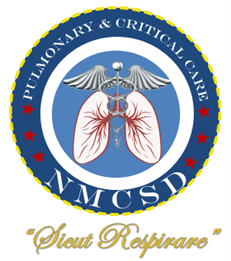- Rotation Director: Laura Crotty, MD
- Rotation Location: VA San Diego Healthcare System
- Rotation Duration: One 2-week block
- Trainees/month: One
Educational Purpose and Rotation Description:
The VA consult service provides the fellow with the opportunity to evaluate, diagnose, and treat hospitalized and outpatient adult patients, both male and female, with a wide variety of pulmonary diseases with a diverse group of patients within the Veterans Affairs medical System. Fellows are responsible for coverage of the Inpatient pulmonary consults (not sleep, not ICU). Seeing acute or short-term follow-up pulmonary clinic patients each day as scheduled. Responding to tagged view alerts in CPRS and calling patients back for various pulmonary needs/concerns when necessary. Fellows are sometimes also responsible for Covering VA ICU home call 1x/week and on the weekend.
- Acquire knowledge of and gain clinical experience in the following clinical areas:
- Obstructive lung diseases, including asthma, bronchitis, emphysema, bronchiectasis, and cystic fibrosis.
- Pulmonary malignancy – primary and metastatic
- Pulmonary infections, including tuberculosis, fungal and those in the immunocompromised host
- Diffuse interstitial lung disease
- Pulmonary vascular disease, including primary and secondary pulmonary hypertension and the vasculitis and pulmonary hemorrhage syndromes
- Occupational and environmental lung disease
- Iatrogenic respiratory disease, including drug-induced disease
- Acute lung injury, including radiation, inhalation, and trauma
- Pulmonary manifestations of systemic disease, including collagen vascular diseases that are primary in other organs
- Respiratory failure, including adult respiratory distress syndrome, acute and chronic respiratory failure in obstructive lung diseases, and neuromuscular respiratory drive disorders.
- Disorders of the pleura and the mediastinum
- Genetic and developmental disorders of the respiratory system
- Postoperative pulmonary complications
- Acquire knowledge (indications, contraindications, complications, and limitations) of and competence in performing the following procedures:
- Management of pneumothorax (needle insertion and drainage systems)
- Diagnostic and therapeutic procedures, including thoracentesis, pleural biopsy, flexible fiberoptic bronchoscopy, and related procedures.
- Examination and interpretation of sputum, bronchopulmonary secretions, pleural fluid/tissue, and lung tissue for infectious agents; cytology; and histopathology
- Thoracostomy tube insertion and drainage
- Acquire knowledge of and ability to interpret the following diagnostic studies and data pertaining to:
- Chest roentgenograms
- Computed axial tomograms
- Radionuclide scans
- Pulmonary angiograms
- Other radiologic procedures
- Interpretation of antibiotic levels and sensitivities
- Gain additional knowledge, skills, attitudes, and educational experience in the core competency areas of patient care, medical knowledge, practice based-learning, interpersonal and communication skills, professionalism, and systems-based practice by doing the following:
- Discussing end of life care issues, pain management, and advanced care directives with patients and their families when appropriate
- Communicating effectively with the primary care team and consultants from other services to ensure the optimal care of patients on whom the fellow is consulting
- Avoiding discussion of patients in public areas
- Obtaining informed consent for all invasive procedures
- Utilizing the internet and computer search strategies to obtain the latest diagnostic and treatment recommendations for patients
- Clearly communicating consultative recommendations in writing (and in person when appropriate) to requesting physicians
- Keeping the attending physician informed of significant changes in patient status and recognizing potentially serious findings or trends.
- Communicating patient orders to nurses, therapists, and other personnel in a professional manner and according to hospital guidelines
- Learning and applying hospital and national clinical guidelines/pathways for common pulmonary diseases
- Looking for and identifying socioeconomic and language barriers to medical care
Learning Venues and Teaching Methods:
Direct Patient Care: The entirety of the rotation will take place at the Arrowhead Regional Medical Center
Reading Material:
- Fellows will be expected to have a current ATLS certification prior to beginning the rotation.
- Principles of Adult Surgical Critical Care edited by Niels D. Martin (Editor), Lewis J. Kaplan
Evaluation:
The trainee will receive a written evaluation at the end of their rotation based on cognitive, patient management, procedural and humanistic skills. This evaluation, including areas for improvement, will be discussed personally with the trainee at the end of the rotation and then forwarded to the Program Director for inclusion in the trainee’s permanent file.
